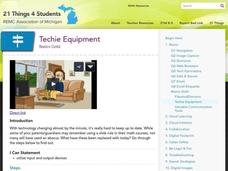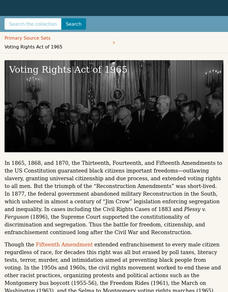School Improvement in Maryland
Court Proceedings Civil Cases
What's the difference between civil and criminal law? How do the court proceedings differ in these two types of trials? How do the standards of proof differ? Why do these differences exist? As part of their examination of the US court...
Facing History and Ourselves
BPS Civil Rights
Include moments of heroism in a social studies module that includes three units. Focusing on the murder of Emmett Till, the movement of nonviolent resistance, and segregating schools in Boston, the units explore key events of the civil...
Facing History and Ourselves
Civil Rights Historical Investigations
The murder of Emmett Till, the Selma to Montgomery march, and the desegregation of Boston schools are the focus of three units that ask class members to investigate why these events were so key in the struggle for civil rights. Groups...
Curated OER
Lesson 4: The Judiciary: A Brief Introduction to the Courts System
Focusing on the judicial branch of government, the fourth lesson in this series explores the structure of the US courts system. Beginning with an engaging activity based on the short story The Lady or the Tiger, students go on to examine...
Judicial Learning Center
Types of Court Cases
How can one court acquit someone of a crime, while another convicts the person of the same one? It's all because of the differences between civil and criminal trials. An informative resource provides scholars in the field of criminology...
Judicial Learning Center
Why Study Landmark Cases?
Why study landmark Supreme court cases? A helpful lesson offers a brief but valuable argument for the importance of these cases in the field of criminology. It introduces scholars to some key terms necessary for studying court cases and...
Alabama Department of Archives and History
New York Times Co. v Sullivan: The Alabama Case that Changed Libel Law
Malice aforethought? Can the New York Times be held libel for false claims appearing in its ads? The Supreme Court case New York Times v Sullivan changed the interpretation of the First Amendment. Class members examine these changes and...
Judicial Learning Center
Getting Ready for Trial
A courtroom can be a scary place for the uninitiated. Get familiar with the process using a helpful overview of the activities that take place prior to both civil and criminal cases. The lesson explains the differences between civil and...
School Improvement in Maryland
Supreme Court Case Overview I
As part of a study of the 14th Amendment to the United States Constitution, class members examine four Supreme Court decisions—Gitlow v. New York, Mapp v. Ohio, Gideon v. Wainwright, and Griswold v. Connecticut—that incorporated the due...
Alabama Department of Archives and History
"Scottsboro Boys": A Trial Which Defined an Age
Here's a must-have resource. Whether your focus is racism, the Great Depression, the "Scottsboro Boys" trial, or part of a reading of To Kill A Mockingbird, the information contained in the seven-page packet will save hours of research...
Curated OER
Lesson 5: In the Courtroom: Understanding the Players and the Action
Young lawyers put Goldilocks on trial as they develop an understanding of the legal system in the final lesson of this five-part series. After learning about key terms relating to litigation, learners are assigned roles and reading...
School Improvement in Maryland
Immigration Legislation
What is the purpose of immigration legislation? How has this legislation evolved over the years? What are the factors that caused these changes? Class members research immigration legislation to determine whose rights the laws are...
Alabama Department of Archives and History
Birmingham, 1963: Spring Jubilation Part 2
The release of Martin Luther King, Jr. from the Birmingham jail, the Children's March, and the bombings of the Gaston Motel and the home of Reverend A.D. King's home. As part of a study of the civil rights movement, class members...
Carolina K-12
African Americans in the United States Congress During Reconstruction
The Civil Rights Act of 1866, which granted citizenship to all males in the U.S., resulted in the first African Americans to be elected to Congress. Class members research 11 of these men, the challenges they faced, and craft...
University of Arkansas
Promises Denied
"Promises Denied," the second instructional activity in a unit that asks learners to consider the responsibilities individuals have to uphold human rights, looks at documents that illustrate the difficulty the US has had trying to live...
Judicial Learning Center
Your Day in Court
Whether out of choice or necessity, people want to know what will happen on a typical day in court. A helpful lesson walks scholars in the field of criminology through the trial process from opening statements to the final verdict.
Digital History
The Crisis of 1833: Tariffs and Nullification
This resource offers a detailed review of the events that led South Carolina to nullify the Tariffs of 1828 and 1832, as well as to pass the Nullification Ordinance, which questioned the federal government's authority to enforce any law...
Judicial Learning Center
The Constitution and Rights
What's the right way to teach young historians about the Bill of Rights? Many an instructor has asked this question when pondering lesson plans over the US Constitution. The Constitution and Rights is a nifty resource that provides a...
Facing History and Ourselves
Emmett Till: Choosing to Remember
Mamie Till, the mother of Emmett Till and civil rights activist, believed that her son's murder was the last straw before public outrage over racial injustice spilled over into the Civil Rights Movement of the 20th century. A history...
Digital Public Library of America
Voting Rights Act of 1965
Despite the passing of the Thirteenth, Fourteenth, and Fifteenth Amendments, as well as the passing of the Voting Rights Act of 1965, the struggle to ensure fair voter registration and election procedures continues. Young historians...
Library of Congress
Stars, Stripes and Symbols of America: Comparing Our Flag, Past and Present
Your young historians will compare and contrast the details of the American flag today with an an image of the nation's flag from the post-Civil War era, and identify the flag's importance as a national symbol through analysis worksheets...
Schoolwires
12th Grade Expository Reading and Writing Research Project
The beauty in this resource is the lengthy list of highly charged, controversial-issue research topics. Categories include issues of race, politics, law, environment, education, athletics, gender, and technology. After selecting a topic,...
University of Arkansas
Individuals Making a Difference
The focus of this, the third in a five-activity unit study of human rights, is on individuals who made a difference. Billy Bowlegs, Dr. Sun Yat Sen, Fannie Lou Hamer, Michi Weglyn, and Yuri Koshiyama are some of the people class members...
University of Arkansas
Our Responsibilities
The fourth in a five-instructional activity unit examining human rights and personal responsibility asks class groups to investigate a current rights issue, and using the provided graphic organizer, summarize the issue, consider which...

























